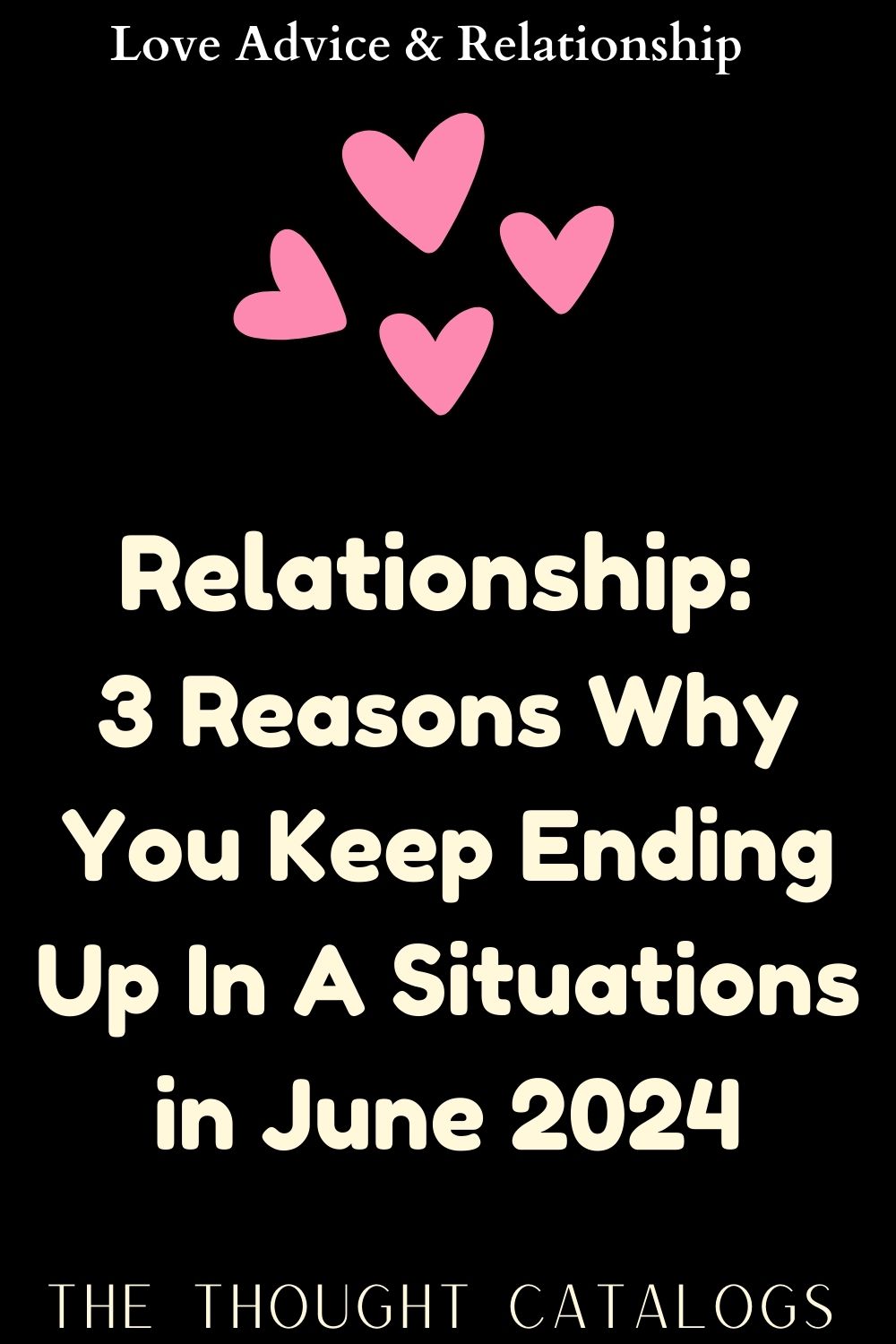Relationship: 3 Reasons Why You Keep Ending Up In A Situations

Introduction
Have you ever found yourself stuck in a situation? You know, that murky grey area between friendship and a committed relationship? Situationships can be confusing and emotionally draining. Understanding why you keep ending up in these ambiguous relationships is crucial for breaking the cycle and moving towards healthier, more fulfilling connections.
Reason 1: Fear of Commitment
Understanding the Fear of Commitment
Fear of commitment is a common issue that can lead to situations. This fear often stems from past experiences, such as witnessing unhealthy relationships or going through a painful breakup. It can also be rooted in a fear of losing one’s independence or making the wrong choice.
How Fear of Commitment Leads to Situationships
When you’re afraid of commitment, you might avoid defining the relationship. This can result in a situation where both parties enjoy the benefits of companionship without the responsibilities of a committed relationship. You might find yourself hesitant to discuss the future, preferring to keep things casual and undefined.
Overcoming Commitment Issues
The first step to overcoming commitment issues is self-awareness. Recognize your fears and understand where they come from. Therapy or counseling can be incredibly beneficial in addressing these deep-seated fears. Additionally, try to gradually expose yourself to commitment in small steps, building trust and comfort over time.
Reason 2: Poor Communication
The Role of Communication in Relationships
Effective communication is the foundation of any healthy relationship. It involves not just talking but also listening and understanding your partner’s perspective. Good communication helps to build trust, resolve conflicts, and deepen emotional intimacy.
Signs of Poor Communication
Signs of poor communication include avoiding difficult conversations, misunderstandings, frequent arguments, and feeling unheard. If you or your partner often misinterpret each other or struggle to express your needs and feelings, it can lead to a lack of clarity about the relationship’s status.
Improving Communication Skills
To improve communication, practice active listening, where you fully focus on your partner without planning your response while they are speaking. Be open and honest about your feelings and needs. Regular check-ins with your partner can also help to ensure that both of you are on the same page.
Reason 3: Low Self-Esteem
The Impact of Self-Esteem on Relationships
Self-esteem plays a significant role in how you perceive and conduct yourself in relationships. Low self-esteem can make you settle for less than you deserve, accepting undefined relationships because you don’t believe you’re worthy of something better.
Identifying Low Self-Esteem
If you constantly doubt your worth, feel insecure, or rely heavily on others for validation, these are signs of low self-esteem. You might also avoid pursuing a committed relationship because you fear rejection or believe you’re not good enough.
Building Self-Esteem for Healthier Relationships
Building self-esteem involves self-compassion and positive self-talk. Focus on your strengths and achievements. Surround yourself with supportive people who uplift you. Engaging in activities that make you feel good about yourself can also boost your self-worth.
The Psychology Behind Situationships
Attachment Styles
Your attachment style, formed in childhood, can influence your adult relationships. Those with an avoidant attachment style might struggle with intimacy and commitment, leading to situations. Understanding your attachment style can help you navigate relationships more effectively.
Emotional Unavailability
Emotional unavailability often leads to situations. If you or your partner are emotionally distant, it can prevent the relationship from progressing. Addressing emotional unavailability usually requires introspection and, sometimes, professional help.
Fear of Vulnerability
Fear of vulnerability can make you hesitant to fully invest in a relationship. Opening up and allowing yourself to be seen and understood by your partner is essential for a committed relationship.
How to Transition from Situationships to Healthy Relationships
Setting Clear Boundaries
Establishing clear boundaries is crucial. Discuss what you want from the relationship and ensure that both parties are on the same page. This clarity helps prevent misunderstandings and unmet expectations.
Expressing Your Needs and Desires
Communicate openly about your needs and desires. Be honest about what you’re looking for in a relationship and encourage your partner to do the same. This mutual understanding is vital for transitioning to a committed relationship.
Seeking Professional Help
If you find it challenging to navigate these transitions on your own, seeking help from a therapist or counselor can be beneficial. They can provide strategies and support to help you build healthier relationship patterns.
Red Flags in Situationships
Recognizing Red Flags
Common red flags include inconsistent communication, reluctance to define the relationship, and avoidance of future planning. If you notice these signs, it’s crucial to address them early.
Addressing Red Flags Early
When you identify red flags, have an open and honest conversation with your partner. Addressing these issues early can prevent further confusion and help you both decide the relationship’s direction.
The Role of Social Media in Situationships
Impact of Social Media on Modern Relationships
Social media can significantly influence relationships, often creating unrealistic expectations and fostering insecurity. The constant comparison with others can also lead to dissatisfaction in your relationship.
Managing Social Media Influence
Set boundaries for social media use and focus on building a strong connection offline. Be mindful of how social media affects your relationship and communicate with your partner about any concerns.
Personal Growth and Self-Reflection
Importance of Personal Growth
Personal growth is essential for maintaining healthy relationships. It involves continuous self-improvement and self-awareness, which contribute to a stronger sense of self and better relationship dynamics.
Techniques for Self-Reflection
Practicing mindfulness, meditation, and journaling can help you reflect on your behaviors and thought patterns. This self-awareness allows you to identify areas for growth and improvement.
Benefits of Journaling
Journaling helps you process your thoughts and emotions, providing clarity and insight into your relationship patterns. It’s a powerful tool for personal growth and self-discovery.
The Importance of Self-Love
Defining Self-Love
Self-love is about valuing and appreciating yourself. It involves taking care of your physical, emotional, and mental well-being and recognizing your worth.
Practicing Self-Love
Engage in activities that bring you joy and fulfillment. Prioritize your needs and practice self-care regularly. Self-love empowers you to set healthy boundaries and make choices that are in your best interest.
How Self-Love Improves Relationships
When you love yourself, you’re more likely to attract and maintain healthy relationships. Self-love fosters confidence and resilience, enabling you to navigate relationship challenges effectively.
Navigating Situationships in Different Life Stages
Situationships in Your 20s
In your 20s, you’re often exploring your identity and what you want in a relationship. Situationships can be more common during this stage as you figure things out.
Situationships in Your 30s and Beyond
As you get older, your priorities and expectations may change. You might seek more stability and commitment, making it crucial to address any patterns of situations.
Case Studies and Real-Life Examples
Personal Stories
Hearing from others who have navigated situations can provide valuable insights. These stories can highlight common experiences and solutions.
Lessons Learned
Learning from others’ experiences can help you avoid similar pitfalls and adopt strategies that lead to healthier relationships.



